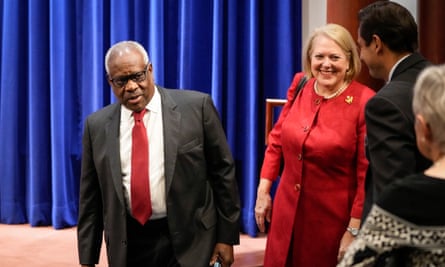Five days before Michael Kirk’s documentary about the love and lives of Clarence and Ginni Thomas was set to air on PBS, ProPublica dropped another bombshell story about the power couple.
The supreme court justice and his conservative activist wife had been accepting private school tuition payments on behalf of the great-nephew they are raising as their son. The funds came from Harlan Crow, the far-right Texas billionaire who has also been in the hot seat for bankrolling the couple’s luxury vacations. “This thing that I do for a living is exhilarating, and a little bit terrifying,” Kirk said as he and his team geared up for a long weekend of reworking the final cut.
The work was already shaping up to be more entertaining than a documentary about Clarence and Ginni Thomas has any right to be. Set to premiere on Frontline on Tuesday night, Clarence and Ginni Thomas: Politics, Power and the Supreme Court is a psychologically astute two-hour feature (slated, as of three weeks ago, to run at half the length) that lays out the origin story and driving motivations behind one of the more mystifying duos of our time.
Kirk has made more than 50 documentaries for the Frontline series, including recent films about Vladimir Putin and Nancy Pelosi. “I had said to my staff: I’m longing to get a little emotion and some characters in our movies again,” he said of landing on his latest subject. At its core, the documentary tells a Shakespearean tale of humiliation and revenge. “It’s so improbable it’s a novel,” the author Kurt Andersen, Ginni’s childhood neighbor, says in a filmed interview. “It’s a novel I wouldn’t believe.”
Other talking heads include the New Yorker staff writer Jane Mayer (who also worked on the film as a reporter); Clarence’s Yale Law School classmate John Bolton, former US ambassador to the UN and national security adviser; and an assortment of Thomas’s former friends, colleagues, and an ex-girlfriend who all offer anecdotes that help explain how a Black boy who grew up in a Savannah home without a toilet became what the hosts of Pod Save America call “the supreme court’s most scandal-plagued rightwinger” and half of what the Harvard Law School professor Randall Kennedy coins “the it couple of the far right”.

Kirk recalled a conversation he had while making the movie. “One person we talked to said that in the caste system that exists in America, especially for minority people, Clarence Thomas was born an untouchable, and has spent his life trying to rise up.”
The son of an absent father and a mother who wasn’t able to care for him, Thomas was raised by his grandfather, an abusive man. At school Thomas was teased by his classmates, who called him “ABC”, short for America’s Blackest Child. There was a stint at a seminary, where Thomas studied to become a priest, followed by a flirtation with campus radicalism and the Black power movement. Thomas eventually enrolled in Yale Law School, where he developed his views on affirmative action. Every prestigious law firm he applied to turned him down, which he interpreted as proof that affirmative action was a broken system. He has saved all his rejection letters, which he keeps near at hand to this day. “He has a list of grievances,” said Kirk. “It’s very complex.”
Thomas found a spot in the Washington DC conservative scene, and became a Reagan administration insider. Things clicked into place in 1986 (or halfway through the film) when he met Ginni at a conference for affirmative action, which they both opposed. Here was Ginni, who’d grown up in an ultra-conservative family in a well-to-do all-white enclave of Omaha, Nebraska. “It was priming the pump for Ginni to become a believer in and a spreader of conspiracy theories,” said Kirk. She found a devout, serious man, another true believer, and was truly besotted. “I just had a [single] picture of her where she’s not smiling, and I have hundreds and hundreds of pictures of Ginni,” the director said. Ginni and Clarence became engaged months after they shared a taxi to the airport. “It’s absolutely a love story,” Kirk said. “They really are each other’s best friends.”
Thomas doesn’t consume mass media, but he has Ginni, whose parents subscribed to conspiracy theories and who would go on to embrace QAnon and become a devotee of Donald Trump. Another close confidant was Rush Limbaugh. “Limbaugh brought politics and the culture war to Clarence, and fed that impulse inside of him,” said Kirk. “He was feeding the fear factor, and feeding the binary view of the world.” Now the spotlight is on Crow, who influences the justice in a more lavish if less concrete fashion. Crow takes Thomas on high-flying vacations and paid for a documentary about Thomas where the justice was quoted saying: “I prefer the Walmart parking lot to the [exotic] beaches and things like that.”
Kirk and his team were not able to penetrate Crow and Thomas’s private bubble. The layer of mystery that they cultivate is precisely what concerns Kirk. “We don’t know what [Crow] is saying when they’re fishing, but that’s the point,” said Kirk. “I’m sure a lot of it is about what kind of fish are biting today. But you kind of wonder if they also talk about the kinds of things that the justice of the supreme court sits on top of and helps decide.”
-
Clarence and Ginni Thomas: Politics, Power and the Supreme Court premieres on 9 May on PBS and YouTube. The film will also be available to stream on pbs.org/frontline and in the PBS App
"story" - Google News
May 09, 2023 at 01:32PM
https://ift.tt/J6GZz90
‘So improbable, it’s a novel’: the strange story of Clarence and Ginni Thomas - The Guardian
"story" - Google News
https://ift.tt/1af48nt
https://ift.tt/2GMgh37
Bagikan Berita Ini














0 Response to "‘So improbable, it’s a novel’: the strange story of Clarence and Ginni Thomas - The Guardian"
Post a Comment